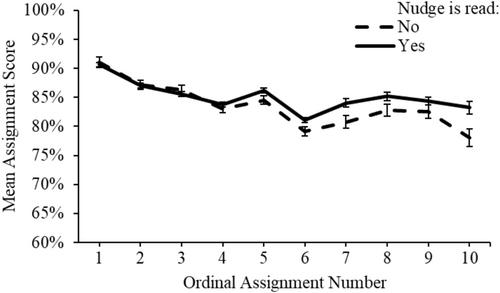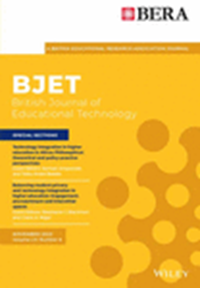Viewing tailored nudges is correlated with improved mastery-based assessment scores
Abstract
Mastery-based assignments typically provide students with multiple opportunities to improve their performance, but getting students to take advantage of these opportunities is difficult. We report on the implementation of a two-part series of nudges designed to improve students' engagement with and performance on mastery-based assignments in high-enrollment, introductory undergraduate courses. Students received one or two email-based nudges for each assignment, providing both decision information and decision assistance. Delivered via email by a digital coaching system that provides tailored support to students, we evaluated the effectiveness of viewing versus not viewing these personalized nudges across introductory courses in mathematics, computer science and engineering over five terms at our large, research-intensive university. We used multilevel modelling with a sample of 30,693 assignment scores nested within 79 assignments and 5349 undergraduate students to explore the relationship between students' viewing the nudges and their scores while controlling for performance in other courses and students' baseline proclivities to read email from the coaching system. We find that viewing versus not viewing nudges is significantly related to improved outcomes. Viewing the first of the two-part nudge series is associated with a 3% increase in scores on average. Importantly, we found a significant interaction with prior academic performance such that students with the lowest average academic performance across all courses are predicted to benefit the most—up to 9%—from nudging. Positive impacts are observed in most courses where nudges were implemented and are found to be most impactful for later versus earlier assignments within a term. We discuss the implications of these results for supporting students' decision-making within mastery-based assignment schemes and suggest future research for tailored nudges to support student success.
Practitioner notes
What is already known about this topic
- Nudges are known to be broadly effective, but heterogeneity is observed especially in education where the research base is relatively limited.
- Mastery-based grading is an alternative approach to grading that, among other features, emphasizes learning through an explicit feedback cycle of struggle and revision without penalty.
What this paper adds
- This study assesses the effectiveness of personalized nudges in the context of mastery-based grading in undergraduate STEM courses.
- We examined the efficacy of viewing versus not viewing nudges in the real learning settings of three STEM courses enrolling more than 5000 students.
- We found the nudges to be effective overall, correlated with improvements of approximately 3% in students' assignment scores and most impactful for students with the lowest average academic performance.
Implications for practice and/or policy
- Nudging by email or text message has a low overhead cost and yet may provide materially significant gains in students' assessment scores.
- Nudges can be effectively targeted to specific subsets of students and tailored based on students' prior and concurrent learning analytics data.


 求助内容:
求助内容: 应助结果提醒方式:
应助结果提醒方式:


